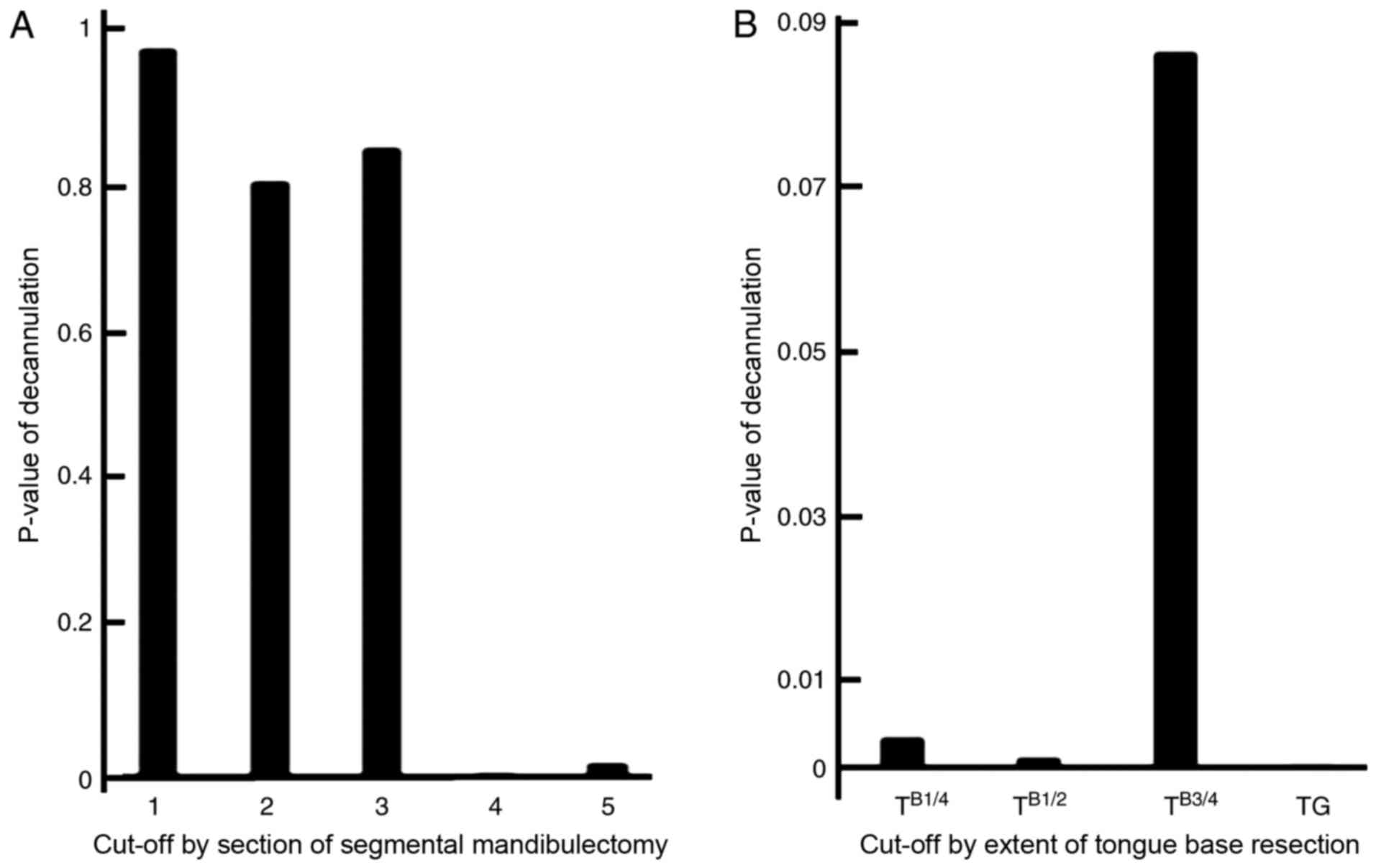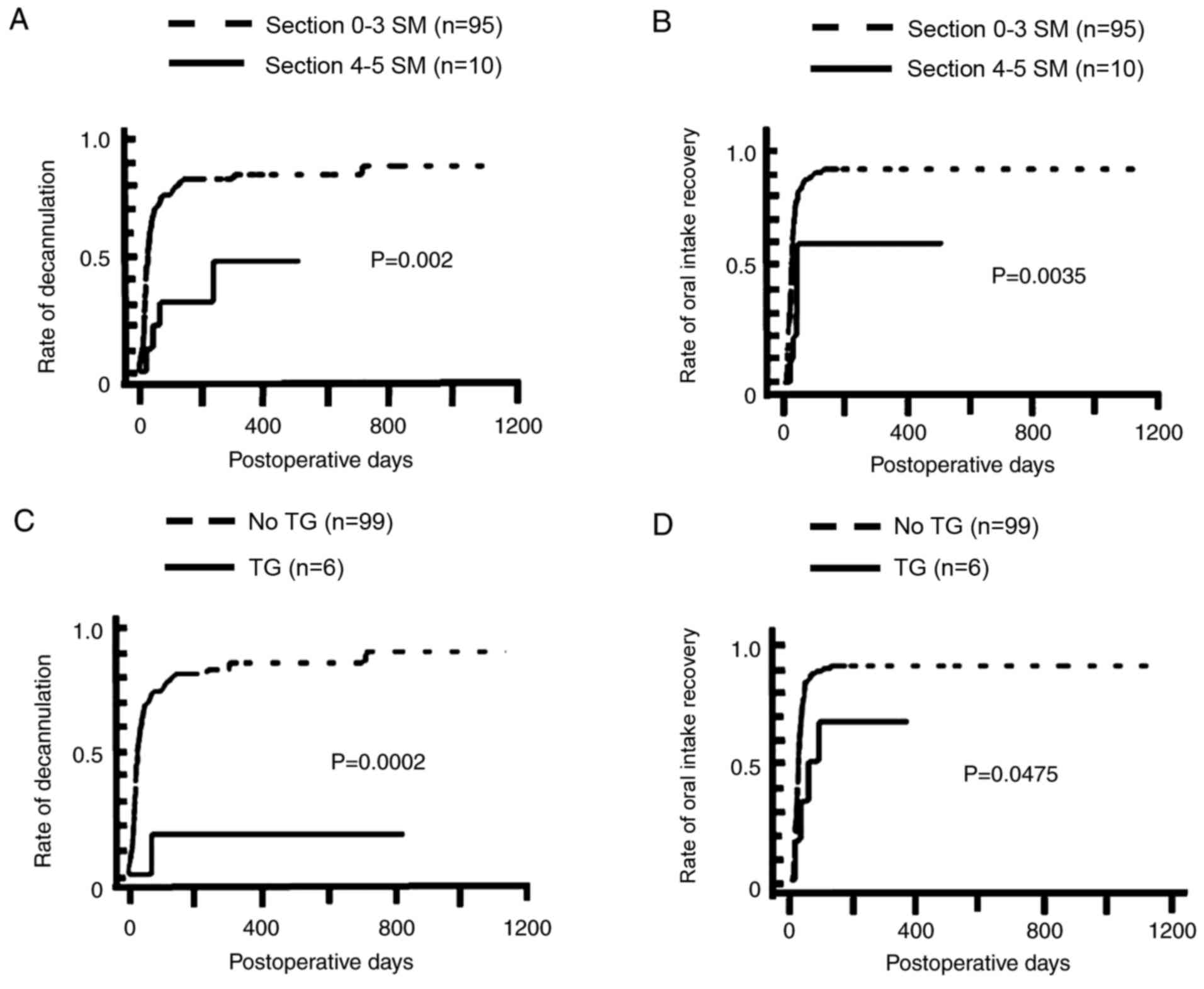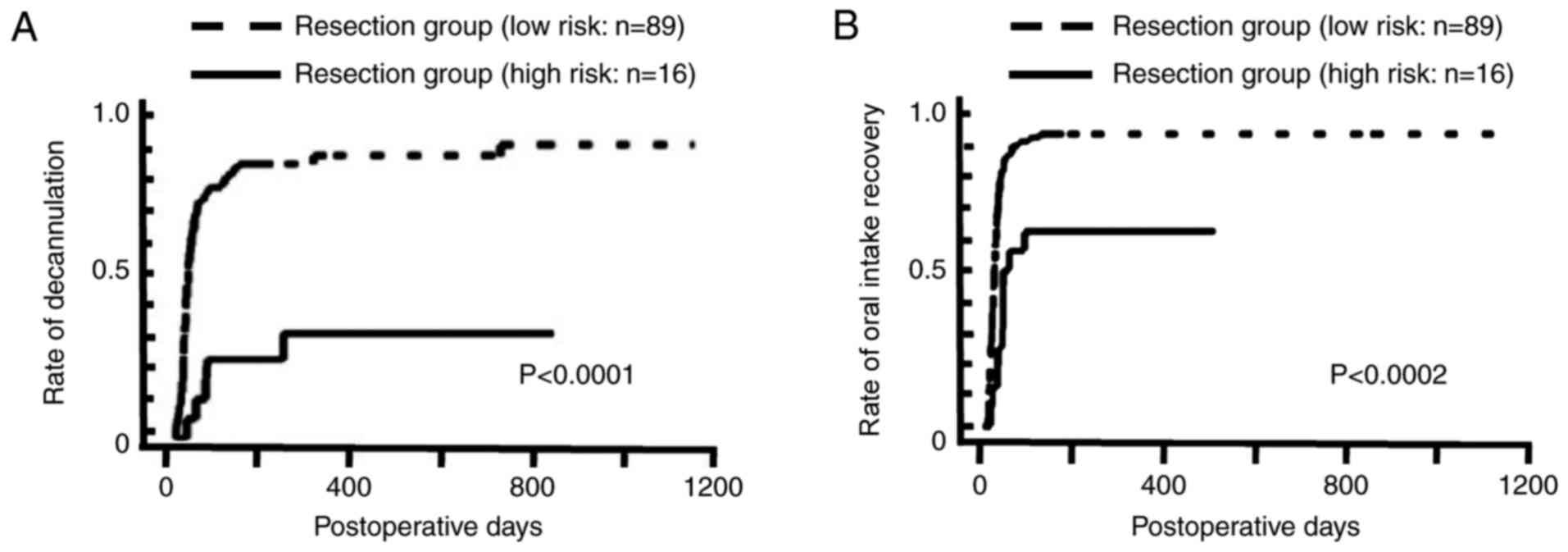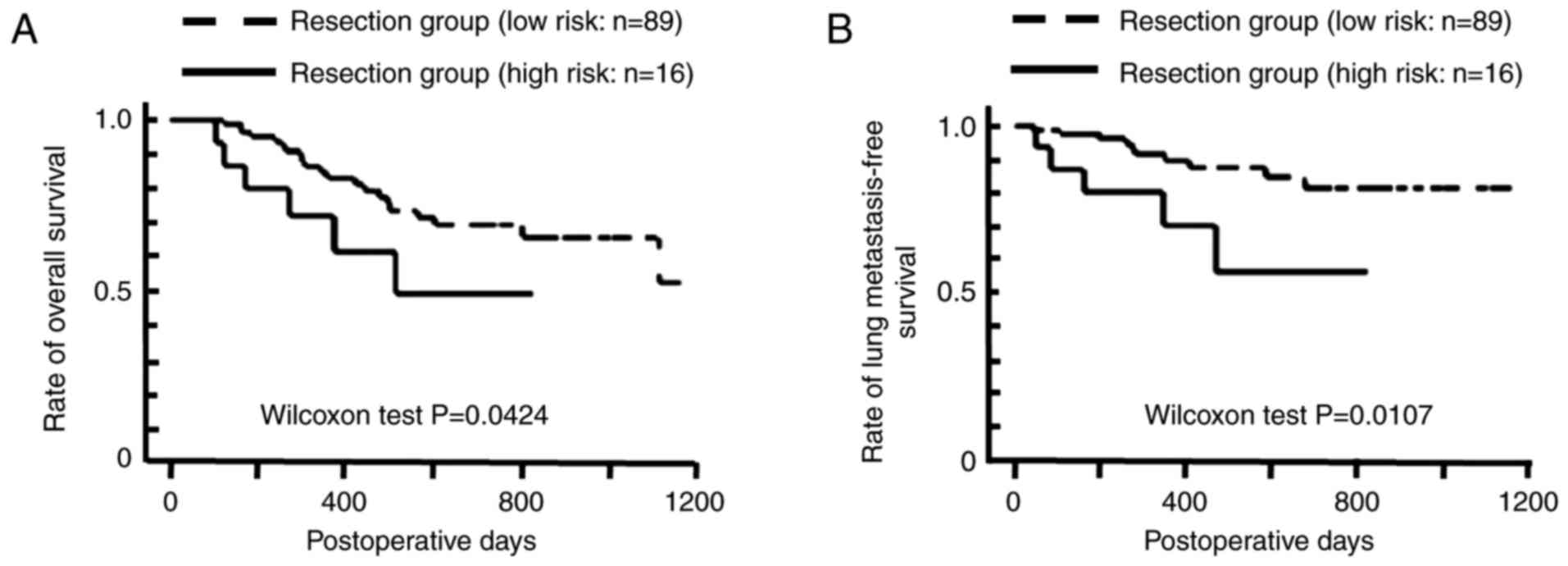|
1
|
Fujimoto Y, Hasegawa Y, Yamana H, Ando A
and Nakashima T: Swallowing function following extensive resection
of oral or oropharyngeal cancer with laryngeal suspension and
cricopharyngeal myotomy. Laryngoscope. 117:1343–1348. 2007.
View Article : Google Scholar : PubMed/NCBI
|
|
2
|
Mizukami T, Hyodo I, Fukamizu H and Mineta
H: Reconstruction of lateral mandibular defect: A comparison of
functional and aesthetic outcomes of bony reconstruction vs soft
tissue reconstruction long-term follow-up. Acta Otolaryngol.
133:1304–1310. 2013. View Article : Google Scholar : PubMed/NCBI
|
|
3
|
Isaac A, Zhang H, Varshney S, Hamilton S,
Harris JR, O'Connell DA, Biron VL and Sekaly H: Predictors of
Failed and Delayed Decannulation after Head and Neck Surgery.
Otolaryngol Head Neck Surg. 155:437–442. 2016. View Article : Google Scholar : PubMed/NCBI
|
|
4
|
Rigby MH and Hayden RE: Total glossectomy
without laryngectomy-a review of functional outcomes and
reconstructive principles. Curr Opin Otolaryngol Head Neck Surg.
22:414–448. 2014. View Article : Google Scholar : PubMed/NCBI
|
|
5
|
Dziegielewski PT, Ho ML, Rieger J, Singh
P, Landgille M, Harris JR and Seikaly H: Total glossectomy with
laryngeal preservation and free flap reconstruction: Objective
functional outcomes and systemic review of the literature.
Laryngoscope. 123:140–145. 2013. View Article : Google Scholar : PubMed/NCBI
|
|
6
|
Chang EI, Yu P, Skoracki RJ, Liu J and
Hanasono MM: Comprehensive analysis of functional outcomes and
survival after microvascular reconstruction of glossectomy defects.
Ann Surg Oncol. 22:3061–3069. 2015. View Article : Google Scholar : PubMed/NCBI
|
|
7
|
Urken ML, Weinberg H, Vickery C,
Bunchbinder D, Lawson W and Biller HF: Oromandibular reconstruction
using microvascular composite free flaps. Report of 71 cases and a
new classification scheme for bony, soft-tissue, and neurologic
defects. Arch Otolaryngol Head Neck Surg. 117:733–744. 1991.
View Article : Google Scholar : PubMed/NCBI
|
|
8
|
Marsh M, Elliott S, Anand R and Brennan
PA: Early postoperative care for free flap head & neck
reconstructive surgery a national survey of practice. Br J Oral
maxillofac Surg. 47:182–185. 2009. View Article : Google Scholar : PubMed/NCBI
|
|
9
|
Lee HJ, Kim JW, Choi SY, Kim CS, Kwon TG
and Paeng JY: The evaluation of a scoring system in airway
management after oral cancer surgery. Maxillofac Plast Reconstr
Surg. 37:192015. View Article : Google Scholar : PubMed/NCBI
|
|
10
|
Butler CE and Lewin JS: Reconstruction of
large composite oromandibulomaxillary defects with free vertical
recuts abdominis myocutaneous flaps. Plast Reconstr Surg.
113:499–507. 2004. View Article : Google Scholar : PubMed/NCBI
|
|
11
|
Kreeft AM, van der Molen L, Hilgers FJ and
Baim AJ: Speech and swallowing after surgical treatment of advanced
oral and oropharyngeal carcinoma: A systematic review of the
literature. Eur Arch Otorhinolaryngol. 266:1687–1698. 2009.
View Article : Google Scholar : PubMed/NCBI
|
|
12
|
Rathod S, Livergant J, Klein J, Witterick
I and Ringash J: A systemic review of quality life in head neck
cancer treated with surgery with without adjuvant treatement. Oral
Oncol. 51:888–900. 2015. View Article : Google Scholar : PubMed/NCBI
|
|
13
|
Shiiba M, Unozawa M, Higo M, Kouzu Y,
Kasamatsu A, Sakamoto Y, Ogawara K, Uzawa K, Takiguchi Y and
Tanzawa H: Controlling distant metastasis and surgical treatment
are crucial for improving clinical outcome in uncommon head and
neck malignancies, such as non-squamous carcinoma. Mol Clin Oncol.
2:609–617. 2014. View Article : Google Scholar : PubMed/NCBI
|
|
14
|
Suzuki H, Beppu S, Hanai N, Hirakawa H and
Hasegawa Y: Lymph node density predicts lung metastasis in oral
squamous cell carcinoma. Br J Oral Maxillofac Surg. 54:213–218.
2016. View Article : Google Scholar : PubMed/NCBI
|
|
15
|
Suzuki H, Hanai N, Nishikawa D, Fukuda Y,
Koide Y, Kodaira T, Tachibana H, Tomita N, Makita C and Hasegawa Y:
The Charlson comorbidity index is a prognostic factor in sinonasal
tract squamous cell carcinoma. Jpn J Clin Oncol. 46:646–651. 2016.
View Article : Google Scholar : PubMed/NCBI
|
|
16
|
Coskunfirat OK, Chen HC, Spanio S and Tang
YB: The safety of microvascular free tissue transfer in the elderly
population. Plast Reconstr Surg. 115:771–775. 2005. View Article : Google Scholar : PubMed/NCBI
|


















